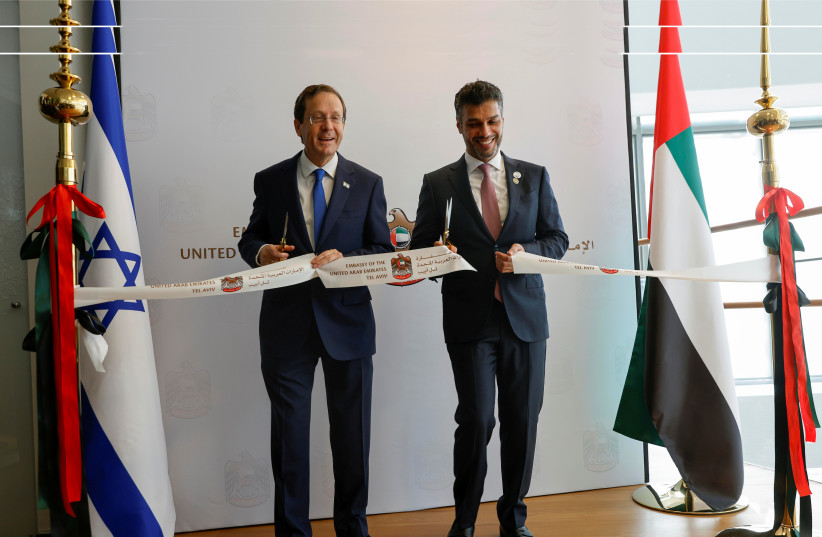The Abraham Accords anniversary this month has increasing importance because of the focus on the next phases that may take place in the region. An important expert in the United Arab Emirates who has always been a keen observer of the Accords is Ahmed Bin Sulayem, the Executive Chairman and CEO of the Dubai Multi Commodities Centre (DMCC).
The DMCC is a “unique combination of Free Zone status, state of the art commercial and residential property and top-tier commodities and financial services,” the organization notes on its website. The ‘Post’ has interviewed Ahmed Bin Sulayem in the past and we took the anniversary as an opportunity to look back and forward at the importance of the Accords.
“The Abraham Accords marked a turning point in our region's history, setting the stage for transformative opportunities across sectors,” he says, discussing his assessment after three years. “In Dubai, the influx of Israeli companies across diverse sectors and scales reflects a promising trend.
“Dubai's reputation as a global business hub provides Israeli entrepreneurs with a platform to explore new markets, foster cross-cultural partnerships, and tap into a diverse pool of talent”
Ahmed Bin Sulayem
Given the synergies between the UAE and Israel markets, the blossoming bilateral business collaborations are entirely foreseeable. The Accords have underscored the potential that emerges when nations unite around a shared vision, catalyzing positive transformation. As we enter the fourth year of this remarkable journey, I believe we have only seen the beginning.”
He also says the Abraham Accords also unleashed a wave of business opportunities, positioning the UAE as a gateway for Israeli enterprises to access global markets. “Dubai's reputation as a global business hub provides Israeli entrepreneurs with a platform to explore new markets, foster cross-cultural partnerships, and tap into a diverse pool of talent,” he notes.

This is important because it connects to Israel’s strengths in technological innovation and its vibrant start-up culture, he says. “The deepening ties facilitated by the Accords are ushering in not just economic collaboration but also fostering a surge in cultural and knowledge exchange.
This dynamic interaction spans areas such as artificial intelligence, renewable energy, and healthcare, presenting exciting prospects for both nations propelling them towards collective growth and advancement.”
In terms of DMCC, there are also important activities. “The increasing presence of Israeli companies in Dubai is reflected in the remarkable 42% increase in new Israeli company registrations in DMCC since the beginning of this year.” This development underscores the growing trade relationship between Israel and the UAE.
He says this has meant a forty percent increase in trade in goods the first five months of 2023 compared to the previous year. The DMCC has also opened its first representative office in Israel which makes it the first UAE-based free zone to do so.
Ahmed Bin Sulayem says the the “Abraham Accords are the beginning of a new Middle East built on peace and prosperity for all.” Now work on making this a lasting peace can begin. “In the UAE, doing business is also about establishing relationships. It’s not just about signing the paperwork but about inviting you to my home and you inviting me to yours. It is so nice to see Israelis in Dubai and host them in our homes and so too, when we visit here, it is so nice to be welcomed to their homes.”
He also shares a special memory. “One moment that stands out to me was in January 2021, when we affixed a mezuzah to the representative office of the Israel Diamond Exchange in DMCC. The placement of the mezuzah is an homage to our founding father, His Highness Sheikh Zayed bin Sultan Al Nahyan, whose fundamental belief in inclusiveness has been a driver of our country's strength and significance on the global stage, ultimately leading to the signing of the Abraham Accords.”
Location, location, location
He praises Dubai as a “perfect location to set up a business and we are a strategically located global trade hub connecting the West to the East and vice versa.” It’s important to point out that DMCC is the world’s most interconnected Free Zone, and the leading trade and enterprise hub for commodities worth approximately 11 percent of all foreign direct investment to Dubai, including many Israeli companies who choose to set up in our business district, according to Ahmed Bin Sulayem.
“When it comes to Israel, trade has been growing, particularly in diamonds with over $1.75 billion traded in 2022 representing a 163 percent year-on-year increase. This sector aligns with the strengths of both Israel and the UAE as global leaders. Moreover, we are observing a steady rise in other goods and services, with bilateral non-oil trade expected to cross the $3 billion-mark next year.
We are also seeing strategic investments, notably the $1 billion purchase by Mubadala Energy of a 22 percent stake in Israel's Tamar gas field which is a landmark moment for regional energy security. This diversification augurs well for shared economic growth, setting the stage for further expansion of Israeli companies into markets that were previously inaccessible. This collaboration encompasses enterprises, investors, and potential international partners, thriving within a vibrant and rapidly expanding ecosystem,” he says.
We asked Bin Sulayem if there are other insights he’d like to share. “Israel's global reputation for innovation and its pioneering start-up culture find fertile ground in Dubai. At the heart of Dubai's technological revolution, DMCC serves as a nexus for collaboration and the cultivation of expansive business relationships…Our proactive role in establishing a thriving global tech ecosystem, spanning blockchain to advancements in smart city technology, positions the free zone as a key entry point for Israeli industries into the region.
As we move into the next chapter of our relationship, I look forward to welcoming many more Israeli companies – from the technology, commodities and other exciting sectors – to Dubai and in doing so foster continued mutual growth and prosperity.”
